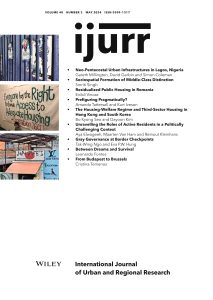Shadow trading is a common activity along state borders. Its omnipresence is puzzling because border checkpoints are highly regulated spaces that are heavily gated and securitized. Most studies attribute such a paradox to ineffective border control and corruption. However, this line of argument overlooks the peculiar nature of border and checkpoint governance. We explore this phenomenon with a case study of the Sino-Kazakh border where shadow traders negotiate their passage every day. We find that border crossing is a highly organized activity dictated by informal yet specific and meticulous rules that are enforced by various state and non-state actors. Together, they constitute a kind of gray governance that is thoroughly entwined with the formal regime. It is a kind of technology of rule that enables the state to selectively enforce formal and informal rules so as to accommodate the conflicting goals of border control.
Details
Written by:
Tak-Wing Ngo & Eva P.W. Hung
Digital Object Identifier (DOI)
10.1111/1468-2427.13226
About DOI

